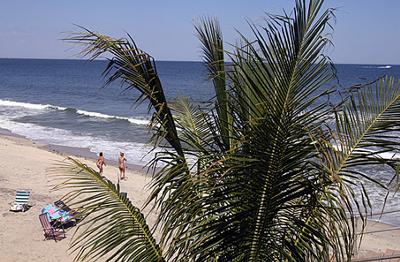Lived (not visited) in Canada
I arrived in Montreal (from the mid-atlantic US) in December of 2007. It was already much colder and icier than the usual February in Washington DC. "That's ok", I thought. After all, I had spent a month in Canada during the two of the previous Januaries, and was familiar with windy -20 degree weather. Even more so, I loved winter and snow.
However, It became evident that it would be a bit different to endure the whole Canadian winter rather than only one month of it. By the time March came around, I was more than ready for the cold to leave. Little did I know, warmth (and leaves for the trees) would not come until May. MAY! I thought "That's ok" (again). I expected the summer to be hot enough and that it would make up for the extreme winter.
Little did I know (again) that there would be days in June when I would have to wear a jacket! I know Canada is supposed to be cold and everything...but c'mon, a jacket in June!? We didn't actually have consistent warmth until sometime in July. By consistently warm I mean to say that I could walk outside in a t-shirt and leave my jacket inside knowing that I would be comfortable. And even then, if the day was cloudy or rainy, the temperature would simply be "neutral" - neither warm nor cold.
Only August was the month that really qualified as "summer" in my mind. I don't think there really is a summertime in Montreal. "Summertime" in Montreal is springtime for me. The average high for Montreal in July (statistically the hottest month) is about 79 degrees (26 Degrees). When you add the wind which is consistent in Montreal all year round, that makes a very, very, "iffy" summer.
The place is extremely humid though, and I found myself sweating even when it wasn't really hot out. I was, however, happy to see the warm air stick around until early October. I was surprised by that, and very grateful for that. Now it is November again, and I don't think I have to explain what the weather is like. Witnessing the "summer" disappear so quickly led me to having consistent dreams of being from where I come from, just walking around in a t-shirt and jeans and enjoying sunny skies like I would for most of the year. Luckily, I'm moving back there in December.
I have never in my entire life been so appreciative of warmth as that May day when I first felt the warm air. Before living in Canada, my reaction to the coming springtime would be one of mild gratitude. But in Canada, my gratitude for that first feeling of warm air caressing my body is a feeling that is forever enshrined in my memory (and I really honestly mean that!). Warmth is something that cannot be replaced by anything. Money, Sex, Drugs, I don't care what it is - Nothing can replace decent weather. It affects your emotions, your personality, your wants and your needs.
I have learned 3 valuable things:
1. Real summer does not exist in Canada, despite what your Canadian friends tell you. Don't believe them. Kids in Montreal go swimming outside if the temperature is 70 degrees (21 Degrees). If you are from Not-Canada or Not-Scandinavia, be prepared for the "summer".
2. Canadians talk about Vancouver, BC like its the Hawaiian Islands or something. Instead of getting a meter of snow for six months, Vancouver just has cold and rainy weather almost all year round.
3. The sun does not exist in Montreal from mid-November until March. There is a possibility that this may depress you.
Thanks for reading, and in all reality, check out Canada in the winter. It is a very beautiful country.
Barry's Response - You'll find a different character Out west, in the prairies. It's rarely humid, and the winter snow is more like spring and summer dust, especially when the winds pick up. Heavy, damp snow like the one in the photo above usually falls in Calgary in March, April, and May or early fall. Sometimes, though, it's really nice out here. Visit Calgary sometime.
Thanks for sharing this interesting and detailed story.Search this site for more information now.
Calgary and Montreal are two fascinating cities with very different climates.
Take a look at their weather patterns:
- Alberta's western province, Calgary, has a combination of continental and semi-arid climates. The summers are warm and the winters are cold. During winter, Chinook winds bring occasional warm air, causing rapid temperature swings. Due to Calgary's location near the Rocky Mountains, it has a dry climate and relatively low precipitation.
- Montreal, on the other hand, is in the eastern province of Quebec and has a humid continental climate. Winters are cold and snowy, while summers are warm and humid. Montreal gets more precipitation because it's closer to the Atlantic Ocean. Montreal's climate is also moderated by the St. Lawrence River and nearby water bodies.
- Each city has its own weather quirks and seasonal variations. Calgary has sunny days, while Montreal has more cloudy days. Calgary has more extreme temperature swings, while Montreal has a gradual transition between seasons.
We can appreciate the diversity and complexity of our planet's weather systems by exploring the climates of Calgary and Montreal.
Comments for Lived (not visited) in Canada
|
||
|
||
|
Click here to add your own comments Join in and write your own page! It's easy to do. How? Simply click here to return to Cold, eh?. |
Do you have concerns about air pollution in your area??
Perhaps modelling air pollution will provide the answers to your question.
That is what I do on a full-time basis. Find out if it is necessary for your project.
Have your Say...
on the StuffintheAir facebook page
Other topics listed in these guides:
The Stuff-in-the-Air Site Map
And,
Thank you to my research and writing assistants, ChatGPT and WordTune, as well as Wombo and others for the images.
GPT-4, OpenAI's large-scale language generation model (and others provided by Google and Meta), helped generate this text. As soon as draft language is generated, the author reviews, edits, and revises it to their own liking and is responsible for the content.



